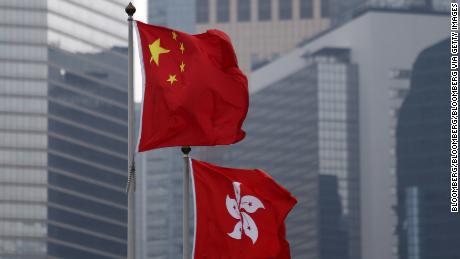But what of the residents who find themselves caught between the two sides, their neighborhoods wracked by tear gas, barricades and weekly violent clashes?
Since June 9, hundreds of thousands of Hong Kong citizens have come out to support the protests and voice their dissatisfaction with the city's government and its policies.
As recently as last weekend, families and older citizens had joined rallies to show their support. But there has been concern over whether escalating acts of violence, including the trashing of Hong Kong's government headquarters, have undermined this backing.
It is this potential "silent majority" that Beijing is hoping to connect with as part of a new tactic experts say is intended to discredit anti-government protesters and bolster support for mainland China.
At a press conference in Beijing on Tuesday, a spokesman for China's top Hong Kong policy office divided the protest movement into two groups.
"At the front are a small number of violent radicals; in the middle are some kind-hearted citizens who have been misguided and coerced to join," said Yang Guang, spokesman for the Hong Kong and Macau Affairs Office.
Speaking to reporters, Yang emphasized the economic and societal damage caused to Hong Kong by the protests and urged citizens to "stand firm and guard our beautiful homeland."
"Let's do as a loving mother does to take the inexplicably angry child home," he said, adding that the protests had gone way beyond the freedom of assembly and expression that Hong Kong is permitted.
Popular support?
Although there is no clear indication that support for the demonstrators is wavering, experts said that the Chinese government will be hoping that the protesters' recent attacks on public property and transport systems, as well as their frequent clashes with police, will steadily estrange them from the rest of the city.
"They're appealing to the moderate, conservative middle-aged people -- parents who are afraid of their kids breaking the law, getting arrested and ruining their futures," said Ma Ngok, an associate professor of Hong Kong politics at the Chinese University of Hong Kong.
Yet Ma said that while Beijing was attempting to tie the protests to radical separatist elements in the city, it was violence by police against demonstrators which was more damaging to public perceptions.
"The police action in the last week or so has invited a lot of resistance from average people, people in the communities, not even young protesters," he said. "So far I haven't actually seen a massive backlash against the protests."
Yang Guang, spokesperson for mainland China's Hong Kong and Macau Affairs Office (HKMAO), speaks concerning the ongoing protests in Hong Kong on August 6.
Yang Guang, spokesperson for mainland China's Hong Kong and Macau Affairs Office (HKMAO), speaks concerning the ongoing protests in Hong Kong on August 6.
But the ongoing unrest is starting to hurt. In the past week the city's stock market has fallen to its lowest point in eight months, dropping almost 10% in a month. Many average Hong Kong citizens invest in the stock market, and many more have their retirement funds tied to the Hang Seng Index.
"Members of the silent majority don't support the extradition bill, but nonetheless they want life to return to normal," said Willy Lam, an adjunct professor at the Chinese University of Hong Kong and a longtime analyst of Chinese politics, in reference to the now shelved bill that sparked that initial protests.
He said Beijing thought that by stonewalling the protesters, they would become more frustrated and infuriated -- leading to increasingly radical acts which the Chinese government hoped would estrange more and more Hong Kongers.
"Beijing hopes that eventually, after a few more weekends of bloody confrontation, public opinion may turn against the radical protesters," he said.
Maki-balita sa Philippines Today sa Facebook, Twitter, Instagram at YouTube!
philippine news today philippine news gma philippine daily inquirer breaking news today philippine news headlines latest news philippines philippine news headlines today abs cbn news today philippine star abs-cbn news today abs cbn news live abs cbn news tv patrol abs cbn entertainment philippine news today manila news philippine news gma abscbn news twitter gma news weather balita ngayon sa gma news tagalog gma news and public affairs 24 oras news gma news entertainment gma news tv shows gma news walang pasok gma news tagalog version philippine news today philippine news headlines philippine news gma philippine news headlines today philippine news tagalog latest news philippines philippine daily inquirer breaking news today philippine newspapers











0 Mga Komento